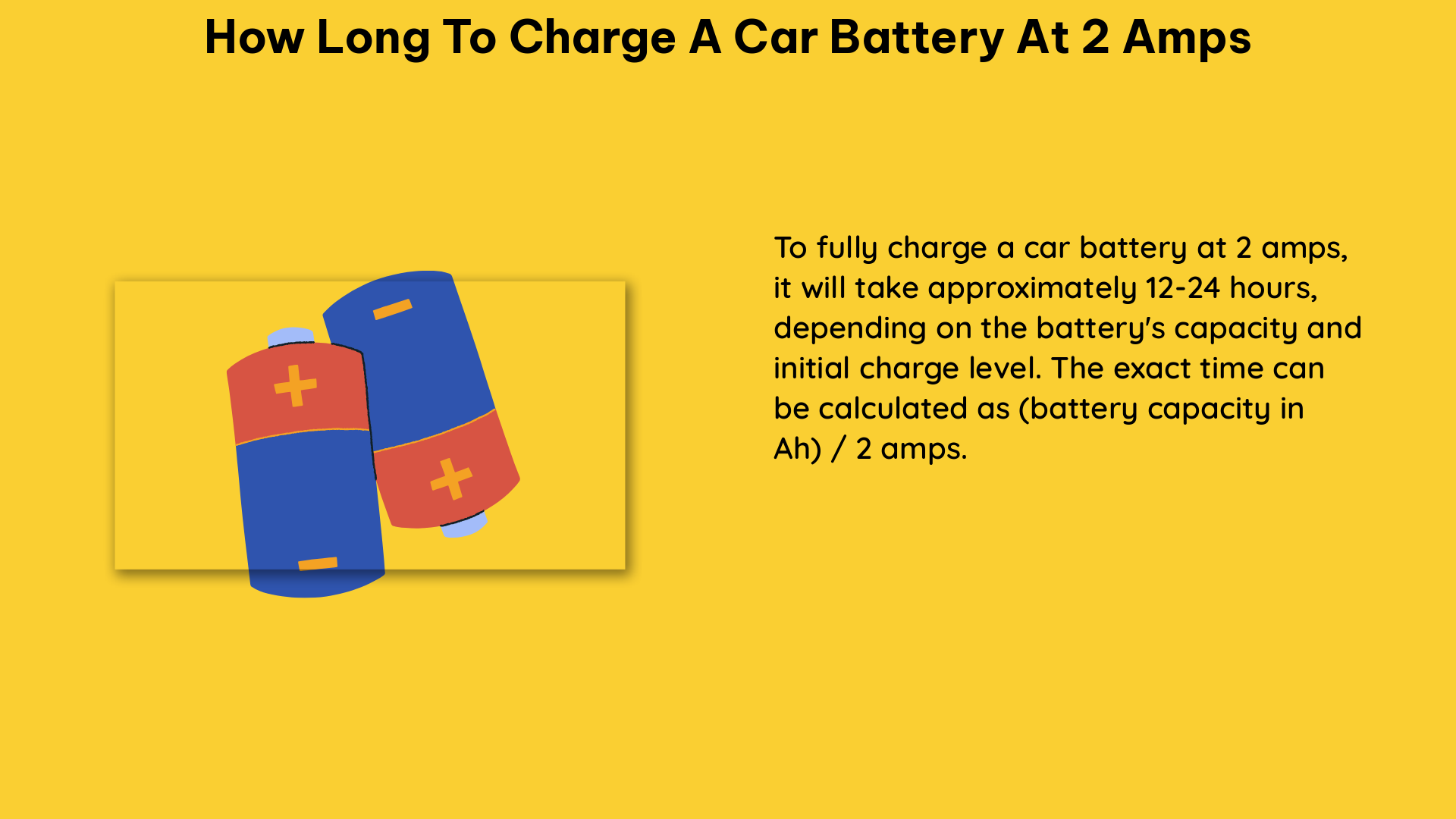Charging a car battery at 2 amps is a common practice, but the exact duration required can vary depending on several factors. This comprehensive guide will provide you with the technical details and step-by-step instructions to ensure your car battery is charged efficiently and safely.
Understanding Battery Capacity and Charging Rate
The time required to charge a car battery at 2 amps is primarily determined by the battery’s capacity, measured in ampere-hours (Ah). A typical car battery has a capacity ranging from 40 Ah to 80 Ah, with higher-capacity batteries taking longer to charge.
To calculate the charging time, you can use the following formula:
Charging Time (hours) = Battery Capacity (Ah) / Charging Rate (Amps)
For example, a 48 Ah battery would take 24 hours to charge at a 2-amp rate (48 Ah / 2 Amps = 24 hours).
Factors Affecting Charging Time

While the formula provides a general guideline, several factors can influence the actual charging time:
-
Battery State of Charge: If the battery is not completely discharged, the charging time will be shorter. For a half-discharged 48 Ah battery, the charging time would be approximately 12 hours.
-
Battery Condition: Batteries in poor condition or those that have been deeply discharged for an extended period may take longer to charge. Sulfation, a common issue with deeply discharged batteries, can reduce the battery’s ability to accept a charge, resulting in a longer charging time.
-
Ambient Temperature: Charging efficiency is affected by temperature. Colder temperatures can slow down the charging process, while warmer temperatures can improve it.
-
Charger Efficiency: The quality and efficiency of the charger itself can also impact the charging time. Higher-quality chargers may be able to deliver the full 2-amp output more effectively.
Monitoring the Charging Process
When charging a car battery at 2 amps, it’s crucial to monitor the process closely to avoid overcharging, which can damage the battery and reduce its lifespan. Here are some tips:
-
Check the Battery Voltage: Periodically check the battery’s voltage using a multimeter to ensure it’s not being overcharged. The ideal voltage range for a 12V car battery is between 12.6V and 12.8V when fully charged.
-
Observe the Battery Temperature: The battery should not become excessively hot during the charging process. If the battery feels significantly warmer than the surrounding environment, it may be a sign of overcharging or a problem with the battery.
-
Set Charging Timers: Consider using a smart charger with automatic shut-off or timer functions to prevent overcharging. This can help ensure the battery is charged safely and efficiently.
-
Consult a Professional: If you’re unsure about the condition of your car battery or the charging process, it’s best to consult a professional mechanic or battery specialist. They can perform a battery test and provide guidance on the optimal charging method and duration for your specific situation.
Conclusion
Charging a car battery at 2 amps is a straightforward process, but understanding the technical details and factors involved can help ensure the battery is charged safely and efficiently. By following the guidelines and tips outlined in this comprehensive guide, you can confidently charge your car battery and maintain its performance for years to come.
References:
– Reddit Discussion on 2A Charger Charging Time
– YouTube Video: How Long to Charge a Car Battery at 2 Amps
– Car City Wholesale Blog: How Long to Charge a Car Battery
– YouTube Video: Charging a Dead Car Battery
– RedFlagDeals Forum Discussion on Charging a Dead Battery

The lambdageeks.com Core SME Team is a group of experienced subject matter experts from diverse scientific and technical fields including Physics, Chemistry, Technology,Electronics & Electrical Engineering, Automotive, Mechanical Engineering. Our team collaborates to create high-quality, well-researched articles on a wide range of science and technology topics for the lambdageeks.com website.
All Our Senior SME are having more than 7 Years of experience in the respective fields . They are either Working Industry Professionals or assocaited With different Universities. Refer Our Authors Page to get to know About our Core SMEs.